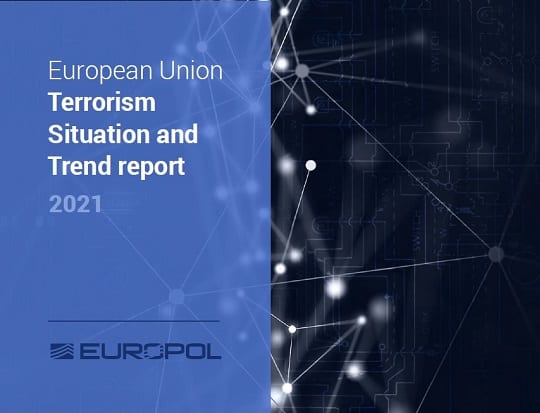The European Union (EU) Terrorism Situation and Trend Report (TE-SAT) 2021 provides facts and figures regarding terrorist attacks and arrests in the EU in 2020.
It is based on quantitative and qualitative data on terrorist offences in the EU and data on arrests of people suspected of involvement in these offences, as confirmed by EU Member States. In addition, Europol’s cooperation partners in third countries provide valuable qualitative information and assessments that enrich the findings of the report. The report also includes information on convictions and acquittals for terrorist offences provided by Eurojust based on data shared by EU Member States.
EU Directive 2017/541 on combating terrorism1, which all EU Member States were obliged to transpose into their national legislation by 8 September 2018, defines terrorist offences as certain intentional acts which, given their nature or context, may seriously damage a country or an international organisation when committed with the aim of:
- seriously intimidating a population;
- unduly compelling a government or international organisation to perform or abstain from performing any act; or
- seriously destabilising or destroying the fundamental political, constitutional, economic or social structures of a country or an international organisation.
The shared legal framework created by EU Directive 2017/541 enables meaningful comparison of data relating to terrorism from different EU Member States. On this basis, the TE-SAT provides statistical data on terrorism in EU Member States. On a national level, terrorism legislation varies, as this Directive sets minimum standards, leaving EU Member States flexibility when legislating.
The TE-SAT reflects EU Member States’ definitions of terrorist offences according to national legislation, which may be broader but not narrower than the definitions set by EU Directive 2017/541. In practice, acts which amount to terrorism under national legislation in one EU Member State might not have crossed this line in another. In the statistics, violent incidents that are classified by national authorities as terrorism are counted as terrorist attacks. Included as arrests are those judicial arrests warranted by a prosecutor or investigating judge. Conviction rates in the EU are generally high, but the numbers of people arrested during the preceding year and those eventually convicted of terrorist offences may differ.
In addition, the TE-SAT mentions specific violent extremist acts and activities, as reported by EU Member States, to provide a more comprehensive picture of the terrorism situation. While there is no universally agreed definition of extremism, extremists generally aim to replace the liberal democratic order and alter the fundamental constitutional principles linked to it. Terrorism, therefore, can be considered to be a set of violent tactics employed mainly by extremists. Acts of terrorism are also committed by actors working for foreign governments (‘statesponsored terrorism’), often to intimidate members of the opposition to these governments.
It is sometimes difficult to draw a clear distinction between terrorism and other forms of extremist violence. Not all forms of extremism sanction the use of violence. The TE-SAT refers to non-violent forms of extremism, in particular ideologies inciting hatred of specific groups or populations, as reported by EU Member States, in case these have the potential of inciting acts of terrorism or violent extremism.
Despite the common legal framework set out in EU Directive 2017/541, discrepancies between what constitutes terrorism persist among EU Member States. The TE-SAT reflects these variations. At the same time, the report shows that all EU Member States face similar challenges in defining the line between violent behaviour and terrorism, with regard to the role of mental state or the role of incitement of lone actor terrorism, for example.


